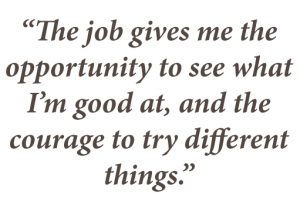 If asked, you would be hard-pressed to pick out the former alcoholic who had just been hired by this busy downtown office.
If asked, you would be hard-pressed to pick out the former alcoholic who had just been hired by this busy downtown office.
Everyone in the bustling workplace looks professional, motivated and is quick with a smile and a warm hello.
And that’s just what Kate Perkins, Former Operations Manager at WorkWithUs Foundation, liked to hear. WorkWithUs is the brainchild of the Streetohome Foundation and TPD, a workforce and HR work solutions company. The new WorkWithUs Foundation provides formerly homeless or marginalized individuals with an opportunity to participate more fully in society by providing employment opportunities aligned with their capabilities and preferences.
So far, WorkWithUs has matched individuals with employers in office environments, manufacturing and warehousing.
WorkWithUs supports individuals to become “work-ready,” providing coaching and training, and follow-up after onboarding to a new job. In return, employers benefit from a highly-motivated individual, and can take pride in helping to strengthen the fabric of their community.
Dressed in a smart black top, dress pants and boots, Maya* looks like any other ambitious young woman with a promising future. However, she ruefully admits that her late teens and early twenties were lost to alcohol addiction. After a series of week-long stays at detox centres, she knew she needed a longer term program to manage her alcoholism.
“I was 25 years-old and realized that I had spent the first half of my 20s binge-drinking and had nothing to account for it,” says Maya.
Using alcohol to deal with the problems in her life was a learnt behaviour. “I saw how my father and brother escaped from life’s problems by drinking, and I did the same.”
After her last detox, she went to a treatment facility where she stayed for four months, followed by second-stage housing for another seven months, where residents learn new life and coping skills to prepare them to live in the community.
Emily Henry, the Recovery Transitions Coordinator at Chrysalis Society, believes when women are ready to get back to work, it can be transformative. “Work, or any kind of meaningful activity, can boost one’s self-esteem, autonomy, and normalize structure and routine.”
 The skills individuals learn when they’re living in second-stage housing also prepare them for working well with others. “Accountability to others is a key principle of recovery, and someone learns pretty quickly that if they’re not doing what’s expected, they’ll find themselves on the outs.” There are a lot of transferable ‘soft skills’ individuals learn on their journey, including conflict resolution, being able to receive constructive feedback, and communicating effectively.
The skills individuals learn when they’re living in second-stage housing also prepare them for working well with others. “Accountability to others is a key principle of recovery, and someone learns pretty quickly that if they’re not doing what’s expected, they’ll find themselves on the outs.” There are a lot of transferable ‘soft skills’ individuals learn on their journey, including conflict resolution, being able to receive constructive feedback, and communicating effectively.
Maya’s new job is providing a renewed belief and confidence in herself.
“I feel really comfortable in my job, and the people have been incredibly supportive. They’ve allowed me to lean into the job, and have been patient as I’ve taken on more and more responsibilities.”
“The job gives me the opportunity to see what I’m good at, and the courage to try different things,” says Maya, who previously only held short-term jobs.
Diane*, her supervisor, is impressed, “She’s easy to talk to, keen to learn, has lots of great energy, and is grateful for the job.”
“It was a seamless transition,” continues Diane. “I’ve trained a lot of people, and she’s probably been the quickest learner.”
Diane’s brother is in recovery, so she understands Maya’s struggle. “These are our sons and daughters and they have every right to the opportunities everyone else does, and contribute to society, provided they earn it. Who wouldn’t want that?”
“A commitment to sobriety and recovery is a skill set that any employer should value. Those are the same traits that an individual brings to the job that makes them successful,” Diane continues.
There’s no doubt that work is an important part of Maya’s recovery.
“I almost cried coming into work this morning,” says Maya. “I feel so appreciative. It was such a great day: the sun was out, and I could see the mountains. It just felt so good to know I was coming to work, and to have a sense of purpose.”
“I wasted so much time just lying in bed, not wanting to do anything.”
“I have a routine now. I go to work Monday to Friday. I go to recovery meetings during the week and I spend time with friends and family on weekends. I feel good about the future.”
Want to learn more about WorkWithUs? Please contact Bernadette at WorkWithUs by emailing [email protected], phoning 604-330-3516, booking a meeting, or connecting on LinkedIn.
*Maya and Diane are pseudonyms. We have not identified the company Maya works for in order to protect her privacy
